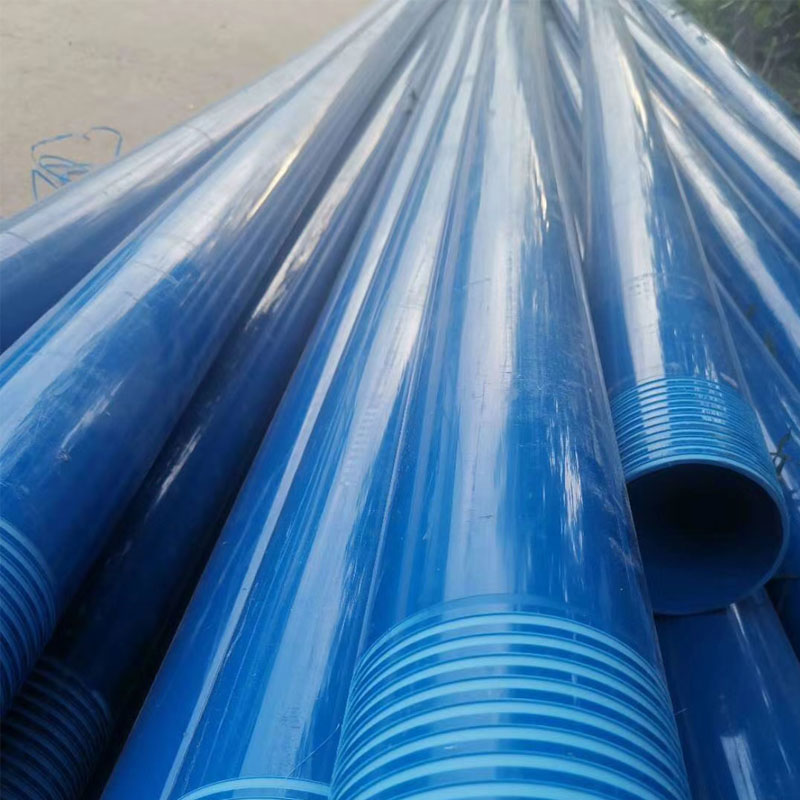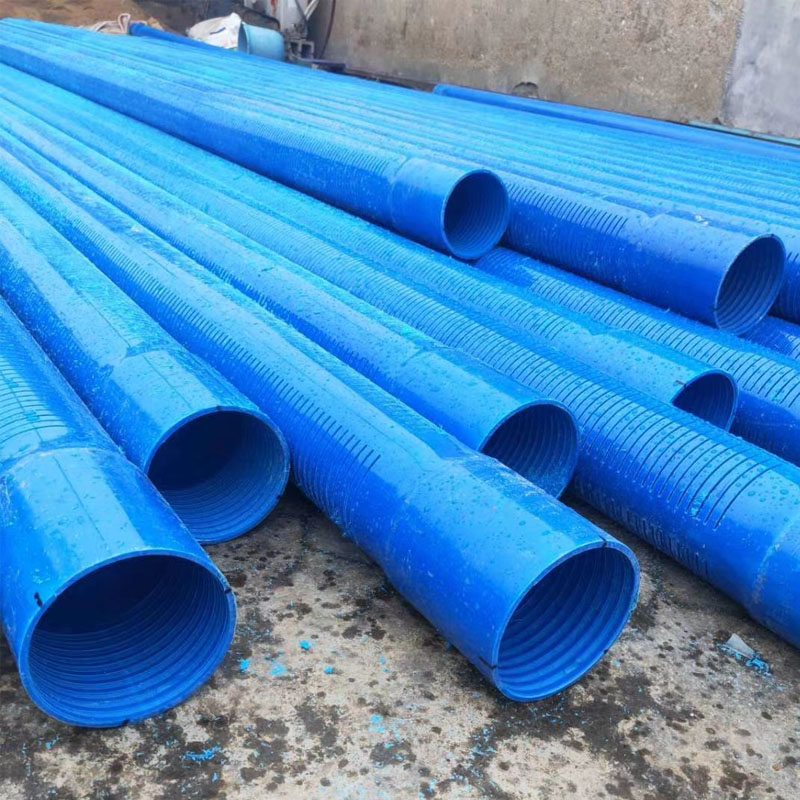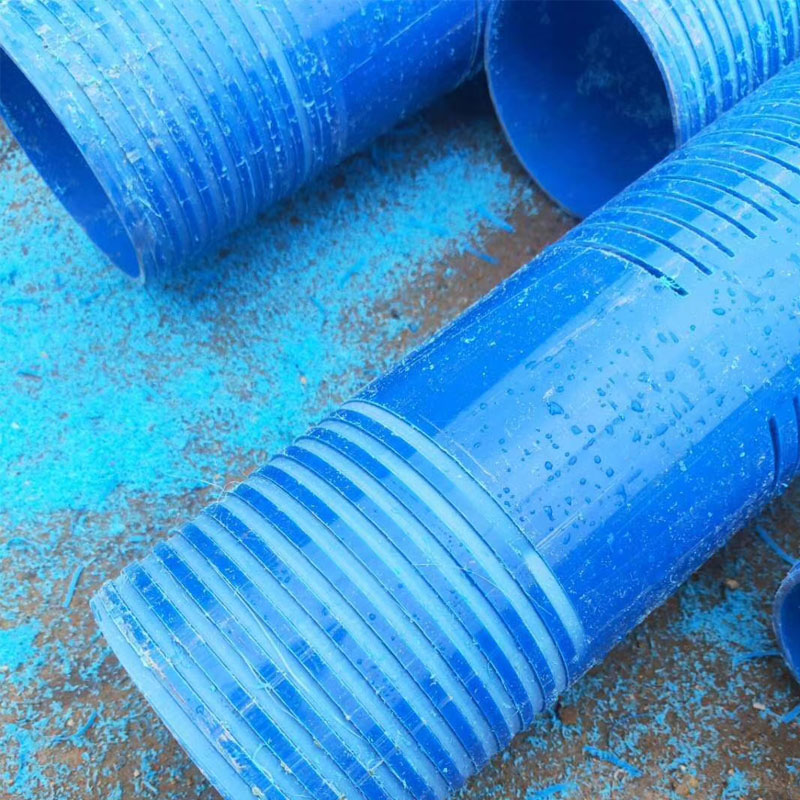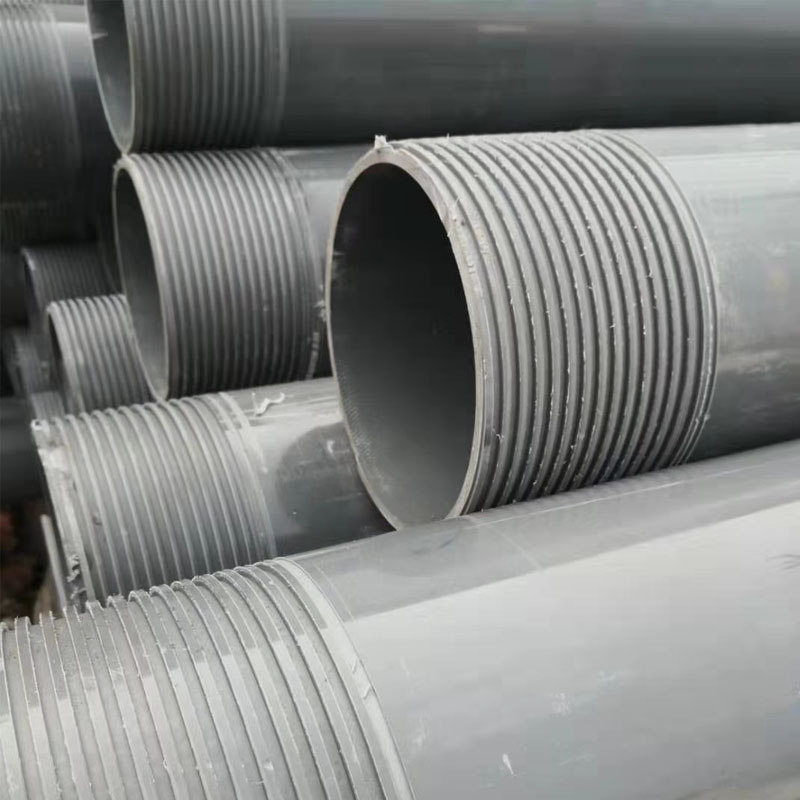Aug . 22, 2025 12:20 Back to list
DN100 PVC Pipes for Well Casings - Durable & Corrosion-Resistant
Introduction to High-Performance PVC Well Casings
In the demanding field of groundwater extraction, monitoring, and geothermal applications, the integrity and longevity of well casings are paramount. Traditional materials often succumb to corrosion, chemical degradation, or excessive weight, leading to premature system failure and costly maintenance. Polyvinyl Chloride (PVC) has emerged as a superior alternative, offering an optimal balance of performance, durability, and cost-effectiveness. Specifically, DN100 PVC pipes for well casings represent a critical component in modern well construction, designed to meet rigorous industry standards and provide reliable service life. These pipes are engineered for a nominal diameter of 100mm, suitable for a wide range of bore sizes and operational requirements, ensuring robust structural support and unimpeded water flow in diverse hydrological conditions.
This comprehensive overview delves into the technical facets, application advantages, and market trends surrounding DN100 PVC well casing solutions, providing B2B decision-makers and engineering professionals with essential insights for informed procurement and project planning. We will explore manufacturing precision, material science, real-world applications, and the strategic benefits of integrating these advanced piping systems into critical infrastructure projects.
Current Industry Trends and Market Dynamics
The global market for well casing materials is experiencing a notable shift towards synthetic polymers, driven by increasing awareness of lifecycle costs and environmental performance. Key trends impacting the adoption of DN100 PVC pipes for well casings include:
- Sustainability & Longevity: Demand for materials with extended service life and minimal environmental impact, reducing the need for frequent replacement and mitigating resource depletion. PVC, being recyclable and highly durable, aligns with these objectives.
- Regulatory Compliance: Stricter regulations regarding water quality and well construction integrity, favoring certified products that meet or exceed international standards like ISO and ASTM.
- Cost-Effectiveness: While initial material costs might vary, the overall installed cost and reduced maintenance expenses associated with PVC pipes offer significant long-term savings compared to metallic alternatives. This includes lighter weight for easier transport and installation.
- Advancements in Material Science: Continuous innovation in PVC formulations enhances mechanical strength, impact resistance, and chemical inertness, making these pipes suitable for increasingly aggressive downhole environments.
- Increased Demand in Water Management: Growing global population and urbanization are escalating the need for efficient water supply, irrigation, and wastewater management systems, directly boosting the demand for reliable well casing solutions.
These trends collectively underscore the strategic importance of PVC as a material of choice for critical infrastructure components like well casings, positioning DN100 solutions at the forefront of modern hydrological engineering.
Manufacturing Process: Precision Engineering for Durability
The production of high-quality DN100 PVC pipes for well casings involves a sophisticated extrusion process, meticulously controlled to ensure uniform wall thickness, dimensional accuracy, and optimal material properties. The process begins with raw material selection and proceeds through several critical stages:
Process Flow Overview:
- Material Preparation (Raw PVC Resin & Additives): High-grade unplasticized PVC (uPVC) resin is carefully blended with stabilizers, lubricants, and pigments. Stabilizers protect against thermal degradation during processing, while lubricants ensure smooth flow and surface finish. This precise formulation is critical for the pipe's long-term performance and chemical resistance.
- Extrusion: The blended PVC compound is fed into a twin-screw extruder. Here, under controlled heat and pressure, the material is melted and homogenized. The molten PVC is then forced through a die to form the continuous pipe profile. This stage dictates the pipe's outer diameter (OD), inner diameter (ID), and wall thickness.
- Calibration & Cooling: Immediately after exiting the die, the hot pipe enters a vacuum calibration tank. The vacuum helps to size the pipe accurately, maintaining its circularity and dimensions. Cold water sprays rapidly cool the pipe, solidifying its shape and locking in its physical properties. Consistent cooling prevents internal stresses and ensures structural integrity.
- Haul-Off & Cutting: A haul-off unit gently pulls the pipe through the cooling tanks at a constant speed, synchronized with the extruder output. Downstream, an automatic cutter precisely cuts the continuous pipe into predetermined lengths, typically 3 or 6 meters.
- Slotting/Screening (for Well Screens): For well screen applications, the pipe undergoes a precision slotting or perforating process using specialized CNC machinery. This creates uniform, burr-free slots or perforations that allow water ingress while preventing sand and sediment from entering the well. Slot width and pattern are engineered based on specific geological conditions and project requirements.
- Threading/Belling: Ends of the pipes are either threaded (typically male-female buttress threads for secure, leak-proof connections) or socketed (bell-ended) for solvent-weld or gasketed joints. Precision threading ensures ease of assembly and high tensile strength at the joints under downhole conditions.
-
Quality Control & Testing: Throughout and after the manufacturing process, rigorous quality control checks are performed. This includes:
- Dimensional Verification: OD, ID, wall thickness, and length are measured against specifications.
- Impact Resistance: Samples are tested for their ability to withstand external forces.
- Tensile Strength: Measures the pipe's resistance to breaking under tension.
- Hydrostatic Pressure Testing: Internal pressure tests to ensure the pipe can withstand operational pressures without leakage or burst.
- Chemical Resistance: Verification against common ground chemicals and water contaminants.
- Packaging & Storage: Finished pipes are bundled, labeled, and prepared for shipment, ensuring protection against damage during transit and storage.

Figure 1: Advanced extrusion line for PVC pipe manufacturing.
Testing Standards and Target Industries:
Our DN100 PVC pipes for well casings comply with stringent international standards, including ISO 4422 (for PVC-U pipes), ASTM F480 (for PVC well casing and screen pipe), and local equivalent standards, ensuring reliability and universal applicability. These pipes typically offer a service life exceeding 50 years under normal operating conditions due to their inherent corrosion resistance and robust mechanical properties.
Target industries include:
- Water Supply & Drainage: For potable water wells, irrigation wells, and dewatering applications.
- Geotechnical & Environmental Monitoring: For observation wells, piezometers, and landfill leachate collection systems.
- Agriculture: For irrigation boreholes and drainage systems.
- Mining & Construction: For dewatering, blast hole casing, and ground stabilization.
- Geothermal Systems: As casing for ground-source heat pump boreholes.
Technical Specifications and Parameters
Understanding the precise technical specifications is crucial for selecting the appropriate well casing. Our DN100 PVC pipes for well casings are manufactured to exacting standards, ensuring consistent performance. The table below details key parameters:
DN100 PVC Well Casing & Screen Pipe Specifications
| Parameter | Value/Description | Standard |
|---|---|---|
| Nominal Diameter (DN) | 100 mm (4 inches approx.) | ISO 161/1 |
| Outside Diameter (OD) | 110 mm ± 0.3 mm | ISO 4422, ASTM F480 |
| Wall Thickness (SDR options) | SDR 26 (4.2 mm), SDR 21 (5.3 mm), SDR 17 (6.6 mm) | ISO 4422 |
| Material | Unplasticized Polyvinyl Chloride (uPVC) - NSF/ANSI 61 compliant grades available | ASTM D1784, NSF/ANSI 61 |
| Pressure Rating (PN / PSI, based on SDR) | Varies by SDR (e.g., SDR 26 approx. 160 PSI / 1.1 MPa) | ISO 4422 |
| Slot Width (for screens) | 0.25mm to 3.0mm (customizable) | Manufacturer Spec |
| Open Area (for screens) | Typically 8-15% (depending on slot width/pattern) | Manufacturer Spec |
| Length | 3 meters or 6 meters (customizable) | Manufacturer Spec |
| Joint Type | Threaded (Buttress or NPT), Spigot & Socket (Bell) | ASTM F480 |
| Color | Blue or Grey (standard) | Manufacturer Spec |

Figure 2: Precision-threaded DN100 PVC well casing for secure connections.
Application Scenarios and Exemplary Performance
The versatility and robust performance of DN100 PVC pipes for well casings make them ideal for a multitude of hydrological and geotechnical applications. Their inherent advantages translate into tangible benefits across diverse operational environments.
- Potable Water Wells: Providing clean, non-toxic casing for drinking water supply, ensuring no leaching of contaminants into the groundwater. The smooth interior surface minimizes head loss and bacterial growth.
- Irrigation Wells: Essential for agricultural projects, offering high flow rates and resistance to aggressive fertilizers or pesticides that may be present in the soil.
- Dewatering Systems: In construction and mining, these pipes effectively manage groundwater levels, preventing flooding and stabilizing excavation sites. Their robust construction handles varied soil conditions.
- Environmental Monitoring Wells: Critical for precise groundwater sampling without chemical interference from the casing material, making them suitable for regulatory compliance and pollution assessment.
- Geothermal Boreholes: Used as outer casings in geothermal heat pump installations, where their thermal insulation properties are beneficial, and resistance to subterranean conditions is vital.
Customer Feedback Insight: "Our municipal water project in a coastal region faced severe corrosion issues with steel casings due to saline groundwater. Switching to Horonpipe's DN100 PVC casings dramatically reduced our maintenance burden and extended the operational life of our wells by decades. The ease of installation was an added bonus, saving us significant labor costs." - Project Manager, Coastal Water Authority.
Technical Advantages of PVC Well Casings
The adoption of PVC for well casing applications, particularly DN100 PVC pipes for well casings, is driven by a distinct set of technical and operational advantages over traditional materials:
- Superior Corrosion Resistance: Unlike metallic pipes, PVC is immune to electrolytic and galvanic corrosion, as well as degradation from acidic or alkaline groundwater, significantly extending the service life of the well. This is particularly crucial in aggressive geochemical environments.
- Chemical Inertness: PVC does not react with a wide range of chemicals commonly found in groundwater, ensuring no contamination of the well water and preserving water quality. It resists attack from most acids, bases, and salts.
- Lightweight & Easy Installation: PVC pipes are significantly lighter than steel, facilitating easier transport, handling, and installation. This reduces labor costs, equipment requirements, and installation time, especially in remote or challenging terrains.
- High Tensile and Collapse Strength: Engineered for robust performance, PVC well casings possess excellent tensile strength to withstand the stresses of downhole installation and sufficient collapse strength to resist external earth pressures, even in deeper wells.
- Excellent Flow Characteristics: The smooth internal surface of PVC pipes minimizes friction loss, promoting efficient water flow and reducing pumping costs. This also inhibits the buildup of scale and biological fouling.
- Non-Toxic and NSF/ANSI 61 Certified: Many PVC formulations are certified for potable water applications, ensuring safety and compliance with public health standards, a critical factor for drinking water wells.
- Cost-Effectiveness: Combining lower material costs (compared to stainless steel), reduced installation expenses, and minimal maintenance requirements, PVC offers a compelling total cost of ownership over its long lifespan.
Vendor Comparison: Key Differentiators
When selecting a supplier for DN100 PVC pipes for well casings, discerning buyers evaluate beyond basic specifications. A comparison based on critical factors reveals the comprehensive value offered by leading manufacturers.
Comparative Analysis of Well Casing Materials
| Feature/Material | uPVC (e.g., DN100 PVC) | Carbon Steel | Stainless Steel |
|---|---|---|---|
| Corrosion Resistance | Excellent (Inert to most chemicals, no galvanic corrosion) | Poor to Fair (Susceptible to rust, galvanic corrosion, requires coatings) | Good to Excellent (Dependent on grade, susceptible to localized corrosion) |
| Weight | Very Low (Easy handling, lower transport costs) | High (Requires heavy machinery for installation) | High (Requires heavy machinery for installation) |
| Installation Difficulty | Low (Threaded joints, lightweight, no welding) | Moderate to High (Welding, heavy lifting) | Moderate (Requires specialized welding, heavy lifting) |
| Water Quality Impact | Minimal (Non-toxic, NSF/ANSI 61 certified) | Potential for iron contamination, rust particles | Minimal (Generally inert, some grades have trace elements) |
| Service Life | 50+ years (Inert, durable) | 10-30 years (Highly dependent on environment and coatings) | 40-70+ years (Dependent on grade and environment) |
| Cost (Material & Installation) | Low to Moderate (Excellent value over lifecycle) | Low (Material), High (Installation & Maintenance) | High (Material & specialized installation) |

Figure 3: Range of DN100 PVC well casing and screen pipe options.
Our commitment to quality is underscored by various certifications, including ISO 9001 for quality management and ISO 14001 for environmental management. We partner with reputable drilling contractors and water management agencies globally, building a legacy of over 20 years in delivering reliable piping solutions. This track record, coupled with strict adherence to ASTM and ISO standards, solidifies our position as an authoritative supplier in the market.
Customized Solutions for Specialized Projects
Recognizing that every well project presents unique challenges, we offer extensive customization options for our DN100 PVC pipes for well casings. Our engineering team collaborates closely with clients to tailor solutions that precisely meet specific technical requirements and environmental conditions.
- Variable Slotting/Perforation: Custom slot widths (e.g., from 0.25mm to 3.0mm) and patterns can be precisely manufactured to match aquifer grain size distribution, optimizing water yield and preventing sand ingress. This includes bridge slot designs for enhanced structural integrity.
- Custom Lengths: While standard lengths are 3m and 6m, specific project demands for longer or shorter pipe sections can be accommodated to minimize field joints and installation effort.
- Threaded Connections: Beyond standard buttress threads, specialized threading options (e.g., NPT, API) can be provided for compatibility with existing downhole equipment or specific regional standards.
- Pressure Ratings (SDR): Tailoring the pipe's wall thickness (SDR - Standard Dimension Ratio) allows for optimization based on expected hydrostatic and collapse pressures, ensuring suitability for varying well depths and geological formations.
- Special Material Grades: For highly aggressive chemical environments or specific regulatory needs (e.g., higher temperature resistance), specialized uPVC compounds or NSF/ANSI 61 certified materials can be utilized.
Our in-house design and manufacturing capabilities, backed by comprehensive R&D, enable us to deliver bespoke solutions efficiently without compromising on quality or performance.
Application Case Studies
The proven efficacy of our DN100 PVC pipes for well casings is best illustrated through real-world applications:
Case Study 1: Municipal Water Supply Project, Arid Region
A major municipal authority in an arid region faced critical water shortages. The project involved drilling 50 new production wells, each approximately 150 meters deep, in highly mineralized groundwater. Previous attempts with steel casings resulted in rapid corrosion and scaling, severely reducing well yield and lifespan. Our solution involved supplying DN100 PVC well casings with SDR 17 rating for enhanced collapse strength and custom-slotted screens. The lightweight nature of the PVC pipes facilitated faster drilling and installation in remote desert locations, reducing overall project timelines by 20%. Post-installation, monitoring confirmed zero corrosion and consistent high yield over the initial five years of operation, far exceeding the performance of metallic alternatives. This project demonstrated PVC's unparalleled corrosion resistance and ease of deployment in challenging environments.
Case Study 2: Environmental Remediation at an Industrial Site
An environmental consulting firm required a network of 30 monitoring wells at a former industrial site, where groundwater was contaminated with various organic and inorganic chemicals. The casings needed to be chemically inert to avoid interfering with contaminant analyses. Our DN100 PVC pipes, specifically formulated for environmental applications, were chosen for both the monitoring well casings and pre-packed screens. The precision-machined slots ensured accurate aquifer isolation and representative sample collection. The non-reactive nature of PVC eliminated concerns about material degradation or false positive/negative results from casing interaction, providing reliable data for site remediation strategies. The project benefited from the product's certifications for potable water contact, indirectly affirming its inertness for environmental sampling.

Figure 4: A stack of DN100 PVC pipes ready for well casing installation.
Trust and Reliability: FAQ, Logistics, & Support
Frequently Asked Questions (FAQ)
Q1: Are DN100 PVC pipes for well casings suitable for deep wells?
A1: Yes, our DN100 PVC pipes are available in various SDR (Standard Dimension Ratio) ratings, which denote wall thickness. Lower SDR numbers (e.g., SDR 17) indicate thicker walls and higher collapse strength, making them suitable for deeper well installations with greater external pressures. Proper engineering and selection based on well depth and geological conditions are crucial.
Q2: What is the expected service life of PVC well casings?
A2: Under normal operating conditions, PVC well casings are designed for a service life of 50 years or more. Their resistance to corrosion and chemical degradation significantly contributes to this extended lifespan, far surpassing that of unprotected metallic casings.
Q3: Can these pipes be used in areas with seismic activity?
A3: While PVC pipes offer good flexibility, severe seismic activity requires specialized engineering. Our threaded joint designs provide secure connections, and the inherent elasticity of PVC can absorb some ground movement. For high-risk seismic zones, specific design considerations and supplementary well construction methods should be discussed with our engineering team.
Q4: Are your PVC products environmentally friendly?
A4: PVC is a highly durable and long-lasting material, which contributes to sustainability by reducing the need for frequent replacements. Modern manufacturing processes are increasingly energy-efficient, and PVC is recyclable. Our products comply with environmental management standards such as ISO 14001, minimizing our ecological footprint.
Lead Time and Fulfillment
We understand the time-sensitive nature of well drilling projects. Standard orders for DN100 PVC pipes for well casings typically have a lead time of 2-4 weeks, depending on order volume and specific customization requirements. For urgent projects, expedited manufacturing and shipping options are available upon request. Our robust supply chain and efficient logistics partners ensure timely delivery to project sites worldwide.
Warranty Commitments
All our PVC well casing products are backed by a comprehensive 10-year warranty against manufacturing defects and material failures under normal operating conditions. This commitment reflects our confidence in the quality and durability of our products, providing our clients with peace of mind and long-term investment protection.
Customer Support and After-Sales Service
Our dedication extends beyond product delivery. We provide extensive pre-sales consultation, technical support during installation, and responsive after-sales service. Our team of experienced engineers and customer service professionals is available to address any queries, provide troubleshooting assistance, and offer expert guidance throughout the lifecycle of your well project.
Conclusion
The selection of appropriate well casing material is a critical decision impacting the efficiency, longevity, and overall cost-effectiveness of any groundwater project. DN100 PVC pipes for well casings offer a compelling solution, marrying advanced material science with precision engineering to deliver unparalleled performance. From their inherent resistance to corrosion and chemicals to their ease of installation and long service life, these pipes represent a superior choice for modern well construction.
By adhering to rigorous international standards, offering extensive customization, and providing robust technical and logistical support, we ensure that our PVC well casing solutions not only meet but exceed the demanding requirements of B2B clients and engineers across various industries. Investing in our DN100 PVC well casings means investing in long-term reliability, enhanced operational efficiency, and sustainable water resource management.
References
- ASTM International. (2020). ASTM F480/F480M-14(2020) Standard Specification for Thermoplastic Well Casing and Screen Pipe.
- International Organization for Standardization. (2007). ISO 4422-2:2007 - Pipes and fittings made of unplasticized poly(vinyl chloride) (PVC-U) for water supply - Specifications - Part 2: Pipes with integral sockets, including those for pressure applications.
- National Sanitation Foundation (NSF). (2021). NSF/ANSI/CAN 61: Drinking Water System Components – Health Effects.
- American Water Works Association (AWWA). (2009). AWWA C900-07: PVC Pressure Pipe and Fabricated Fittings, 4 in. Through 12 in. (100 mm Through 300 mm), for Water Distribution.
- PVC Pipe Association. (2023). The Environmental Product Declaration for PVC Pipe.
-
HORON 25mm PPR Plumbing Pipes: Durable, Reliable & Leak-Proof
NewsAug.21,2025
-
32mm HDPE Pipes in Coil: Flexible & Durable Water Supply
NewsAug.19,2025
-
Flexible 32mm HDPE Pipes in Coil - Durable & Easy Install
NewsAug.18,2025
-
HDPE Sprinkler Pipe Manufacturers - Quality & Durable Solutions
NewsAug.17,2025
-
Durable DN100 PVC Well Casing Pipes for Reliable Water Supply
NewsAug.16,2025

